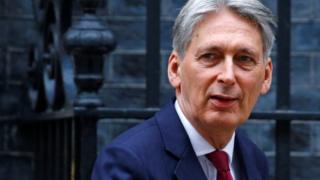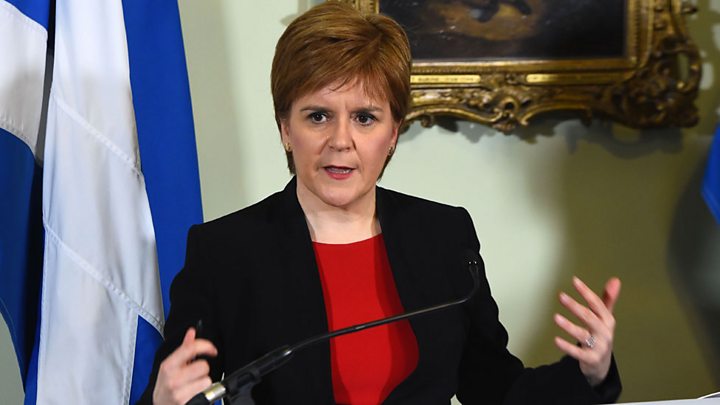 REUTERS
REUTERS
All forms of Brexit will make the UK worse off but Theresa May's plan is the best available, says Philip Hammond.
Analysis of the prime minister's Brexit deal shows the economy will be "slightly smaller" after 15 years, he told BBC Radio 4's Today programme.
But it was not just about the economy, the chancellor added - her plan would deliver "political benefits" as well.
It comes as the government is due to publish its economic analysis on the long-term effects of Brexit on the UK.
The Treasury will set out various scenarios - with the Daily Telegraph saying it will predict £150bn in lost output over 15 years under no deal - compared with if the UK stayed in the EU - with Theresa May's plan costing £40bn.
With two weeks until MPs vote on the deal, Mr Hammond said: "We're going to go out and we're going to sell this deal."
He said if the deal was not voted through Parliament, Mrs May's cabinet would sit down and "decide how best to proceed", looking at how MPs had voted before deciding their next move.
Under any scenario, in a "purely economic sense" the UK would be worse off than if it stayed in the EU, as exiting would created "impediments to our trade", said the chancellor.
But he argued that staying in the EU was not politically "viable" and, he added, Mrs May's planned Brexit deal combined most of the economic benefits of remaining in the EU with the political benefits of leaving the EU.
Asked if the UK would be poorer under Mrs May's deal, Mr Hammond said: "The economy will be slightly smaller in the prime minister's preferred version of the future partnership."
He said Mrs May's deal would reduce to "an absolute minimum the economic impact of leaving the EU, while delivering the political benefits" such as being able to do trade deals outside the EU and "having control of our fishing waters".
Veteran Conservative Eurosceptic Sir Bill Cash said Mr Hammond was effectively arguing for the UK to stay in the European Union in his "extraordinary" statement.
He said the chancellor had ignored potential economic benefits of leaving the EU, asking: "What about the trade deals which could give us the most enormous opportunities throughout the world, if we are able to strike them?"
Under Mrs May's deal, the UK would be able to negotiate trade deals during the transition period after 29 March's Brexit day, but would not be able to implement them until the end of the planned 21 month transition period, which could itself be extended.
Sir Bill, who is among the MPs to have submitted a letter of no-confidence in Theresa May in a bid to remove her as prime minister, said this would keep the UK tied to the EU "indefinitely" with no say over its rules.
The chancellor's comments were seized on by MPs campaigning for another EU referendum, with Labour's Chris Bryant saying on Twitter: "Philip Hammond effectively conceded that the so-called deal is going nowhere and that after 11/12 all options should be on the table. That sounds like we are inching towards #PeoplesVote."
MPs are due to vote on Mrs May's Brexit deal, which she insists is the only option, on 11 December.
According to the Daily Telegraph, the Treasury analysis will show that under Mrs May's deal, the UK's GDP will be between 1% and 2% lower over 15 years than if it stayed in the EU, compared with 7.5% lower under a no deal situation.
The Department for Exiting the EU said it does not comment on leaks.
In other developments, the Commons Public Accounts Committee issued a report warning of a "real prospect" of "major disruption" at UK ports in the case of a no-deal Brexit.
The prime minister is heading to Scotland, where she is expected to tell workers in a factory near Glasgow she believes her deal provides an "unprecedented economic relationship that no other major economy has" and certainty for employers and their staff.
She will also say that moving away from the EU's common fisheries policy (CFP) "which has so tragically failed Scotland's coastal communities" will leave the UK "free to decide for ourselves who we allow to fish in our waters".
The UK sells nearly £1bn of fish produce to the EU every year, and a number of EU countries are insisting that tariff-free trade of that kind can continue only if EU fishing boats continue to get access to UK waters.
The SNP claims the industry will be "sold out".
The party says access to UK waters for EU boats will be used as a "bargaining chip" to secure a good post-Brexit trade deal.

And Scottish First Minister Nicola Sturgeon has unveiled analysis the SNP claims shows Scotland would be left poorer by the deal.
Her party, which has 35 MPs, along with the leadership of Labour, the Lib Dems and Democratic Unionists have all said they will reject Mrs May's deal.
Many Tories have also said publicly they are opposed to Mrs May's deal.
Meanwhile, a row is brewing after the Labour Party demanded the government publish its full legal advice on the Brexit deal this week.
The government has only said it will publish a "full reasoned position statement" laying its out political and legal position on the withdrawal agreement.
BBC Newsnight political editor Nick Watt said a source says the full advice provides a "very stark warning" that there is no way the UK, on its own, would be able to get out of the so-called Northern Ireland backstop.
The backstop - the plan to create a temporary single customs territory to prevent the return of customs posts at the Irish border in the event no EU-UK trade deal comes into force - is controversial because Brexiteers fear it would keep the UK tied to EU rules indefinitely.
Chancellor Philip Hammond said Downing Street will not be publishing the full legal advice because it would be "impossible for the government to function" if such confidential material was made public.
"There's a very important principle here, that the Government must be able to commission impartial legal advice which absolutely tells it like it is to enable it to shape its decisions, while always complying with its legal obligation in the negotiations," he told Today.
No comments:
Post a Comment